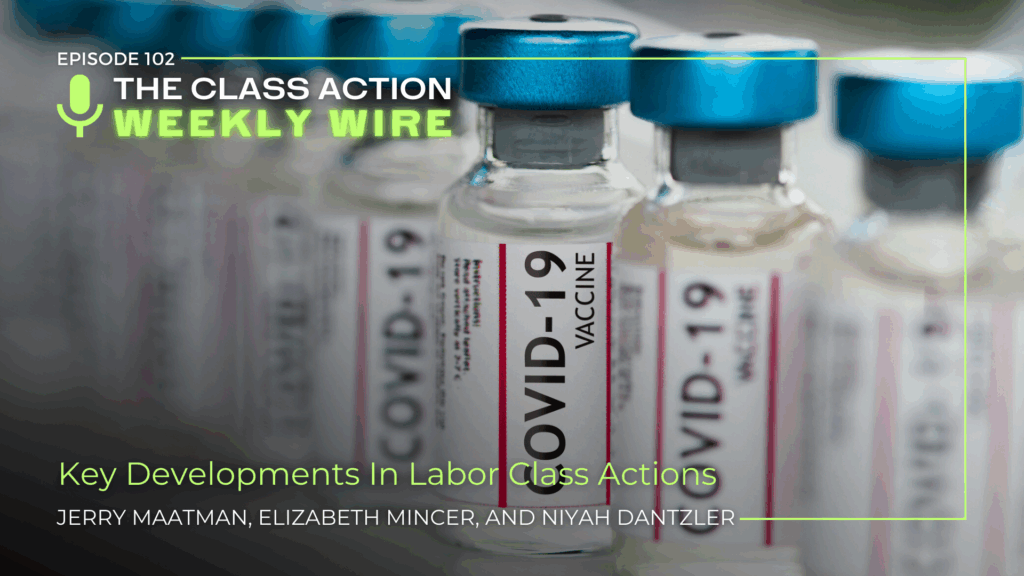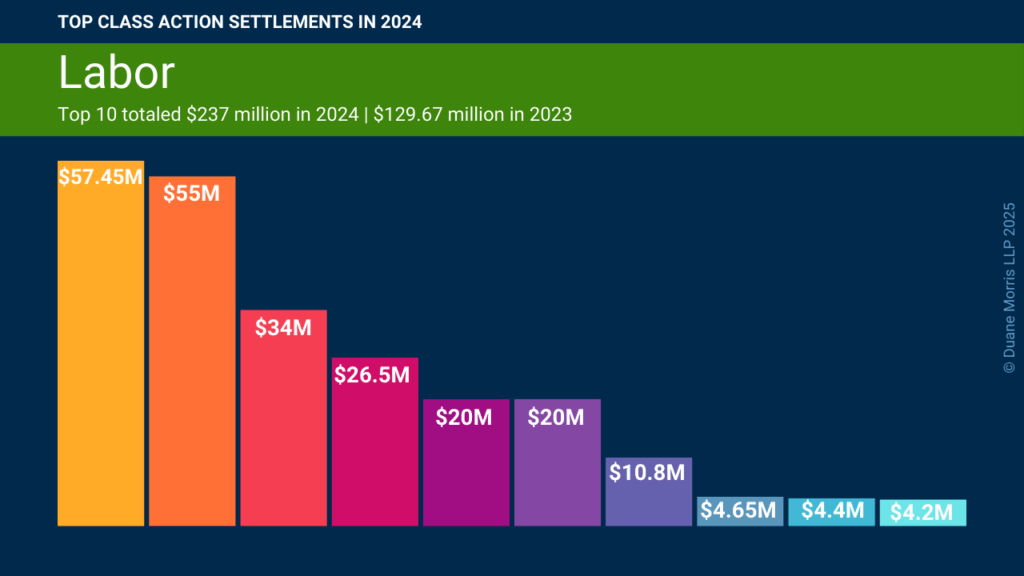
Duane Morris Takeaway: This week’s episode of the Class Action Weekly Wire features Duane Morris partner Jerry Maatman, senior associate Elizabeth Mincer, and associate Niyah Dantzler with their analysis of the key developments in labor class actions, including claims sparked by the impact of the COVID-19 pandemic on the workforce.
Check out today’s episode and subscribe to our show from your preferred podcast platform: Spotify, Amazon Music, Apple Podcasts, Samsung Podcasts, Podcast Index, Tune In, Listen Notes, iHeartRadio, Deezer, and YouTube.
Episode Transcript
Jerry Maatman: Hello, everyone, and thank you for being here again for our next episode of our weekly podcast, the Class Action Weekly Wire. I’m Jerry Maatman, a partner at Duane Morris, and joining me today are Niyah Dantzler and Elizabeth Mincer. Thanks so much for being on our podcast.
Elizabeth Mincer: Great to be here, Jerry.
Niyah Dantzler: Thanks for having me on the podcast, Jerry.
Jerry: Today, we wanted to discuss trends and important developments in the area of labor-related class action litigation. Liz, I know this is an area of special interest in your practice – tell us about the highlights of the past year.
Elizabeth: So, labor law issues often result in class action litigation either brought by advocacy groups, including unions, or by private plaintiffs asserting violations of labor-related statutes. In turn, labor-related class actions can arise in many contexts as the consequence of alleged mistreatment or abuse of workers can give rise to various statutory or constitutional claims. In 2024, courts addressed a number of labor issues in class action litigation. Historically, class action rulings have been brought under statutes such as the Migrant and Seasonal Agricultural Workers Protection Act, the Victims of Trafficking and Violence Protection Act, the Labor Management Relations Act, as well as under various constitutional based theories, and then the state law equivalents. Significantly, the majority of the key labor-related class action litigation decided in 2024 involved claims relating to COVID-19 vaccination requirements.
Jerry: Thanks very much for that overview. Let’s talk about COVID-related rulings then in 2024. Niyah, could you give us a brief overview of the key rulings covered in the 2025 Class Action Review in this space?
Niyah: Absolutely. There were several important rulings, particularly in cases stemming from claims relating to COVID-19 vaccines. For example, the U.S. Court of Appeals for the Ninth Circuit weighed in on a case, Bacon v. Woodward, and that case was brought by a group of firefighters from Spokane, Washington, alleging that the city unlawfully discharged them while they refuse to receive COVID-19 vaccinations in accordance with the governor’s Proclamation that all healthcare providers be fully vaccinated against COVID-19. Although the Proclamation was intended to accommodate sincerely held religious beliefs, the plaintiffs alleged that Spokane did not provide religious accommodations to any city firefighters. They instead claimed that the Proclamation, as applied to them, violated their Free Exercise rights under the U.S. Constitution. The state joined the action as an intervener to defend the Proclamation, and move for a judgment on the pleadings under Rule 12(c). The district court granted the motion, finding that Spokane lawfully applied the proclamation, but on appeal, the Ninth Circuit reversed it, determined that the firefighters had plausibly alleged that the city applied the Proclamation arbitrarily and capriciously, and showed callous disregard to the firefighters’ religious rights, and so the Ninth Circuit highlighted the fact that the fire departments outside of Spokane had permitted religious accommodations and actually sent non-vaccinated firefighters to provide services in Spokane pursuant to mutual aid agreements. Accepting the plaintiffs’ allegations as true, the Ninth Circuit held that firefighters’ claims should move forward because it was possible that they could establish that the Proclamation, as it applied to them, was not narrowly tailored to achieve the goal of stopping COVID-19 spread, as it failed to account for less restrictive alternatives, such as testing, masking, or considering natural immunity.
Jerry: Upon reading that decision, it sure seems to me the Ninth Circuit decision provided some good guideposts for employers trying to accommodate religious exemptions in terms of dealing with public health mandates and underscores the importance of ensuring that these policies are generally applicable but flexible, insofar as they don’t discriminate on the basis of religious practices. Liz, were there significant rulings under the Trafficking Victims Protection Act in 2024 that companies should know about in this space?
Elizabeth: Yes, there was a very interesting case that involved the global supply chain that is important for employers to know about. So, in a case called Doe, et al. v. Apple Inc., the plaintiffs, a group of former child miners who were injured in accidents and their representatives filed a class action against the defendants under the Trafficking Victims Protection Reauthorization Act of 2008, we’ll call TVPRA, which essentially makes it illegal to participate in a venture that uses forced labor. The plaintiffs argued that the defendants participated in a venture by purchasing cobalt through the global supply chain, which included cobalt that had been mined under forced labor conditions. The defendants had purchased this cobalt from large international suppliers, but those suppliers had subsidiaries in the Democratic Republic of the Congo involved in both mechanized, industrial mining, but also informal mining – and informal mining is really a less sophisticated, more crude operation, where the plaintiffs asserted that sort of operation posed severe safety risks and forced labor. The defendants filed a motion to dismiss, and the district court granted the motion. So, a positive outcome there. The district court had determined that the plaintiffs failed to sufficiently prove a direct connection between their injuries and the defendants’ actions, which was just merely buying that cobalt. The district court stated that purchasing cobalt through a supply chain without more direct involvement or control over the mining operations, did not constitute “participation in a venture” under the TVPRA. The case was appealed, and the DC. Circuit affirmed that ruling. It agreed that the plaintiffs failed to prove that the defendant’s participation in that venture actually violated the TVPRA. The D.C. Circuit found that the plaintiffs failed to show how an injunction against the defendants would remedy their injuries, as they were no longer involved in the mining, and the effectiveness of such an injunction was too speculative. The D.C. Circuit also reasoned that the plaintiffs failed to establish that the defendants had a sufficient degree of control or shared purpose with the suppliers to be considered participants in a venture, and that the relationship was that of a buyer and seller.
Jerry: Thanks very much for that overview, that’s a really important case. And those led to some substantial settlements in the labor class action space in 2024. How did the settlement numbers this past year compare to 2023?
Niyah: So, we saw a significant increase in the numbers from 2023 to 2024. In 2023, the top 10 labor settlements totaled about $139 million, whereas in 2024, we got up to $237 million.

Jerry: Well, that’s a big jump. The top settlement areas are something we track every year in the Duane Morris Class Action Review, and we’ll want to keep our eyes on these numbers in 2025 in terms of labor-related class action settlements. Well, Liz and Niyah, thank you very much for lending your thought leadership in this area and being with us today on our podcast. Listeners, thank you for tuning in. And if you have any questions or comments on today’s podcast, please send us a direct message on Twitter @DMClassAction.
Niyah: Thanks, everyone. Great to be here.
Elizabeth: Thanks for having me and thank you to the listeners for being here today.
